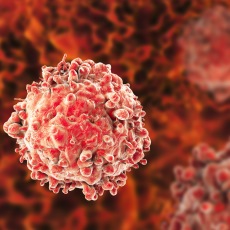

National Institutes of Health
New on the MedlinePlus Leukemia page:
08/23/2018 02:26 PM EDT

Leukemia is cancer of the white blood cells. White blood cells help your body fight infection. Your blood cells form in your bone marrow. In leukemia, the bone marrow produces abnormal white blood cells. These cells crowd out the healthy blood cells, making it hard for blood to do its work.
There are different types of leukemia, including
- Acute lymphocytic leukemia
- Acute myeloid leukemia
- Chronic lymphocytic leukemia
- Chronic myeloid leukemia
Leukemia can develop quickly or slowly. Chronic leukemia grows slowly. In acute leukemia, the cells are very abnormal and their number increases rapidly. Adults can get either type; children with leukemia most often have an acute type. Some leukemias can often be cured. Other types are hard to cure, but you can often control them. Treatments may include chemotherapy, radiation and stem cell transplantation. Even if symptoms disappear, you might need therapy to prevent a relapse.
NIH: National Cancer Institute
- Blood Count Tests: MedlinePlus Health Topic
 (National Library of Medicine)Also in Spanish
(National Library of Medicine)Also in Spanish - Bone Marrow Test
 (National Library of Medicine)Also in Spanish
(National Library of Medicine)Also in Spanish - How Is Chronic Myelomonocytic Leukemia Diagnosed? (American Cancer Society)
- Lab and Imaging Tests (Leukemia & Lymphoma Society)Also in Spanish
 Tumor Marker Tests
Tumor Marker Tests  (National Library of Medicine)Also in Spanish
(National Library of Medicine)Also in Spanish- What Are Bone Marrow Tests?
 (National Heart, Lung, and Blood Institute)
(National Heart, Lung, and Blood Institute)
- Blood Transfusion (Leukemia & Lymphoma Society)
- Bone Marrow Transplantation: MedlinePlus Health Topic
 (National Library of Medicine)Also in Spanish
(National Library of Medicine)Also in Spanish - Choosing a Blood Cancer Specialist (Leukemia & Lymphoma Society) - PDF
- Chronic Myeloproliferative Neoplasms Treatment
 (National Cancer Institute)Also in Spanish
(National Cancer Institute)Also in Spanish - Drugs Approved for Leukemia
 (National Cancer Institute)
(National Cancer Institute) - General Approach to Treatment of Chronic Myelomonocytic Leukemia (American Cancer Society)
- Hairy Cell Leukemia Treatment Option Overview
 (National Cancer Institute)
(National Cancer Institute) - Immunotherapy (Leukemia & Lymphoma Society)Also in Spanish
- Integrative Medicine and Complementary and Alternative Therapies (Leukemia & Lymphoma Society)Also in Spanish
- Myelodysplastic/ Myeloproliferative Neoplasms Treatment
 (National Cancer Institute)Also in Spanish
(National Cancer Institute)Also in Spanish
- Electromagnetic Fields and Cancer
 (National Cancer Institute)Also in Spanish
(National Cancer Institute)Also in Spanish
- Adult T-Cell Leukemia/Lymphoma (Lymphoma Research Foundation)
- General Information About Hairy Cell Leukemia
 (National Cancer Institute)Also in Spanish
(National Cancer Institute)Also in Spanish - Leukemia -- Eosinophilic (American Society of Clinical Oncology)
- What Is Chronic Myelomonocytic Leukemia? (American Cancer Society)
- Do We Know What Causes Chronic Myelomonocytic Leukemia? (American Cancer Society)
- Genetics Home Reference: ataxia-pancytopenia syndrome
 (National Library of Medicine)
(National Library of Medicine)
- Cancer Statistics: Leukemia
 (National Cancer Institute)
(National Cancer Institute) - Facts and Statistics (Leukemia & Lymphoma Society) - PDF
- ClinicalTrials.gov: Leukemia
 (National Institutes of Health)
(National Institutes of Health) - ClinicalTrials.gov: Leukemia, Hairy Cell
 (National Institutes of Health)
(National Institutes of Health) - Types of Treatment: Clinical Trials (Leukemia & Lymphoma Society)Also in Spanish
- Article: Effect of Simultaneous Inhibition of Protein Kinase CK2 and Thymidylate...
- Article: Ceritinib Enhances the Efficacy of Substrate Chemotherapeutic Agent in Human...
- Article: hIL-15-gene modified human natural killer cells (NKL-IL15) exhibit anti-human leukemia...
- Leukemia -- see more articles
- American Cancer Society
- Find a Cancer Doctor (American Society of Clinical Oncology)
- Leukemia & Lymphoma Society
- National Cancer Institute
 Also in Spanish
Also in Spanish - NCI Designated Cancer Centers
 (National Cancer Institute)Also in Spanish
(National Cancer Institute)Also in Spanish
- B-cell leukemia/lymphoma panel (Medical Encyclopedia)Also in Spanish
- Bone marrow transplant (Medical Encyclopedia)Also in Spanish
- Hairy cell leukemia (Medical Encyclopedia)Also in Spanish
- Leukemia (Medical Encyclopedia)Also in Spanish
- Understanding Chemotherapy

 (National Cancer Institute) - PDFAlso in Spanish
(National Cancer Institute) - PDFAlso in Spanish - What to Know about External Beam Radiation Therapy

 (National Cancer Institute) - PDFAlso in Spanish
(National Cancer Institute) - PDFAlso in Spanish


































No hay comentarios:
Publicar un comentario